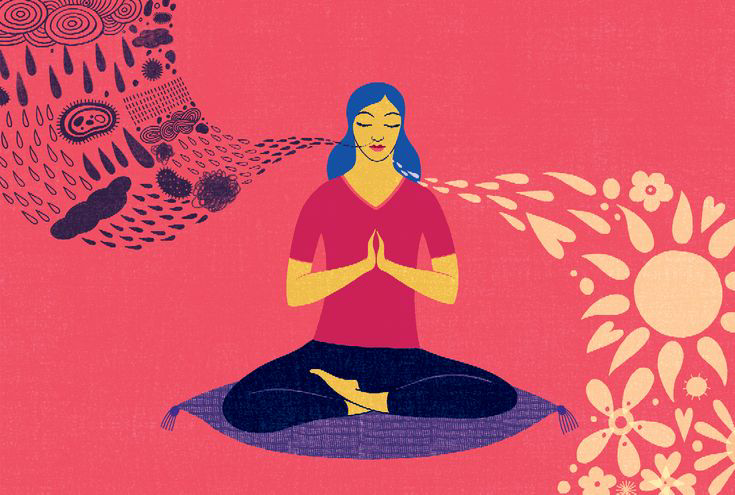Before cultivating love and compassion, it is important to understand what these two terms refer to. In the Buddhist tradition, they are seen as two aspects of the same feeling of benevolence: love is the desire that all beings may be happy, and compassion is the wish that they may be free from suffering.
All kinds of happiness and all sufferings can be included in two categories: those of the mind and those of the body. For most of us, it is the mind that plays the most decisive role in feelings of well-being and ill-being. In comparison, the role of our physical condition is secondary, unless we are seriously ill or in abject poverty.
Usually, love and compassion are mixed with desire and attachment. The love parents have for their children, for example, is biased and limited compared to the unconditional love that the Buddha is talking about.
Similarly, the feeling of being in love is usually more a form of attachment, based on mental projections and fantasies, than true altruistic love. The best evidence for this is that once these projections change, the feeling disappears and sometimes turns into its opposite.
It is possible to experience a love without partiality. It should not come from a simple emotional reaction; it should be based on reflection and lead to a firm commitment. Then it will no longer depend on how others treat us. The goal of the Buddhist practitioner is to cultivate this kind of love, sincerely wishing happiness to all beings in the universe. This is obviously not easy.
Whether others are beautiful or ugly, benevolent or cruel, they are all sentient beings like us. And like us, they want to be happy and not suffer, which is their right, just like us. Recognizing that all beings are equal in their aspirations and their right to happiness, we feel a sense of empathy that brings us closer to them. As we get accustomed to this impartial altruism, we finally experience a sense of universal responsibility.
With time and patience, we can come to experience such universal love. Unconditional love is only really possible when the concept of an independent self has faded away.
Guided Meditation on Compassion – click here
Anger and hatred are the biggest obstacles to selfless love.
Where do we start
To cultivate compassion, it is not enough to believe in its benefits or marvel at the beauty of such feelings. We have to make an effort and use all the circumstances of daily life to change our thoughts and behavior.
We must begin by addressing anger and hatred, which are the biggest obstacles to selfless love. As we all know, these extremely powerful emotions can turn our minds upside down. If we do not control them, they will poison our entire existence and make it impossible to taste the joy of loving all others.
If you are among those who do not see anger as a negative emotion and find that in certain situations that exasperate you, a burst of anger seems to give you renewed confidence and energy, carefully consider in what state your mind is in those moments.
The energy that your anger brings is blind energy. You cannot know with certainty what effects, positive or negative, it will produce in the end.
So the energy of anger is rarely reliable and can lead us to act in ways that are sometimes highly destructive. When it reaches a certain intensity, it makes us lose all reason, and we can hurt not only others but also ourselves.
To manage difficult situations, fortunately we have an energy as powerful as that of anger, but this time
it is controllable, as it comes from anger’s most effective antidotes: kindness, patience, and reason.
You should understand that in fact, even if your opponents seem to harm you, ultimately they are mainly harming themselves.
Compassion is certainly benevolent and peaceful by nature, but it gives great power, while those who easily lose patience are unstable and not sure of themselves.
When a conflict arises, try to stay humble and sincerely seek an equitable solution. Some people will take advantage of you, or your detachment may provoke an aggressive reaction. Then adopt a firm attitude, but without losing your compassion, and if, to assert your position, you must take strong action, do it without anger.
You should understand that in fact, even if your opponents seem to harm you, ultimately they are mainly harming themselves. To control the instinctive egotistical reflex, which is to fight back, remember you are trying to practice compassion and help others not to suffer the consequences of their actions. If you adopt measures that were chosen with calm, they will be even more effective, powerful, and adapted to the situation.
Those who create this kind of difficulty for us are generally not our friends but our enemies. So if we really want to learn something, we should consider our enemies to be the best teachers we could possibly find. The practice of patience is indeed essential for cultivating love and compassion, and we could not perform that practice if we had no enemies. They deserve our gratitude since it is they who ultimately contribute most to our peace of mind.
Buddha Land content is accessible to all and not behind a paywall.
Reader support allows us to keep the site open to access.
If your circumstances allow, please consider donating to enable Buddha Land to stay online and to keep growing. Every dollar truly helps!
For donations:
PayPal account:
guidance@buddhaland.me



